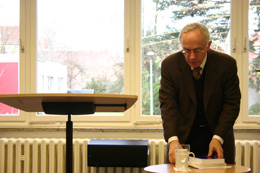
Anthony Price from Birkbeck College, University of London visited ECLA to give two guest lectures (4th and 6th December) on the theme of tragedy in Book X of Plato’s Republic and in Aristotle’s Poetics. Price has published extensively on ethics and moral psychology in ancient-Greek literature and he professes an academic interest in the ‘epistemology of value’. His work fits perfectly with ECLA’s fall curriculum, and the students greatly benefited from his insights. Echoing Aristotle, David Hayes (faculty) drew attention to the ‘astonishing’ in Price’s work, in its search for truth.
Price’s first lecture begged serious questions of the exile of tragedy from Socrates’ city-in-speech, offering, in its critique, reasons why emotional responses to theatrical tragedy were good for the soul. The seductive quality of grief and the dangers of imitation were problematised by Price, who instead offered the notion of ‘quasi-grief’: an emotion ‘transformed by its aesthetic context’. Far from being detrimental to the balance of the separate elements of the soul, the disinterested response of witnesses to theatrical tragedy actually represented the ‘epitome of the well-regulated soul’. The resultant discussion occupied all present for a further hour, before taking the theme into seminars, where the ‘myth of Er’ in the Republic was subjected to critical thinking in the light of Price’s lecture.
Lecture two, presented as ‘Aristotle on Catharsis’, continued Monday’s theme, asking four large questions on the nature of Greek tragic theatre. These included the evocation of pity and fear in a manner which is pleasant to the spectator (catharsis); the unity of tragedy (questions of style and content which might explain why catharsis could be ‘enjoyable’); how tragedy involves the audience emotionally (through the form, through empathy and through imagination); and finally, in uniting the answers to the other three, an exploration of how tragedy is at all enjoyable. Here, in our ability to confront the pity and fear represented on stage, we are flatteringly compared to ‘Aristotle’s really brave man’ who is reassured by his own composure. Moreover, the form of tragedy, which retains its structure (in plot, in verse, etc.) while the horror unfolds, was presented to us as a reason for its power to elate. Order emerges from chaos on stage and is immediately appropriated by the audience: ‘we imagine sharing the predicament of the hero, but to an effect that asserts our own virtue’.
Price’s contribution to the curriculum – his erudition and engaging style – was of considerable value, and was a fitting finale to our dealings with Plato’s Republic, the term’s core text.
By Rob Boddice (Faculty)
